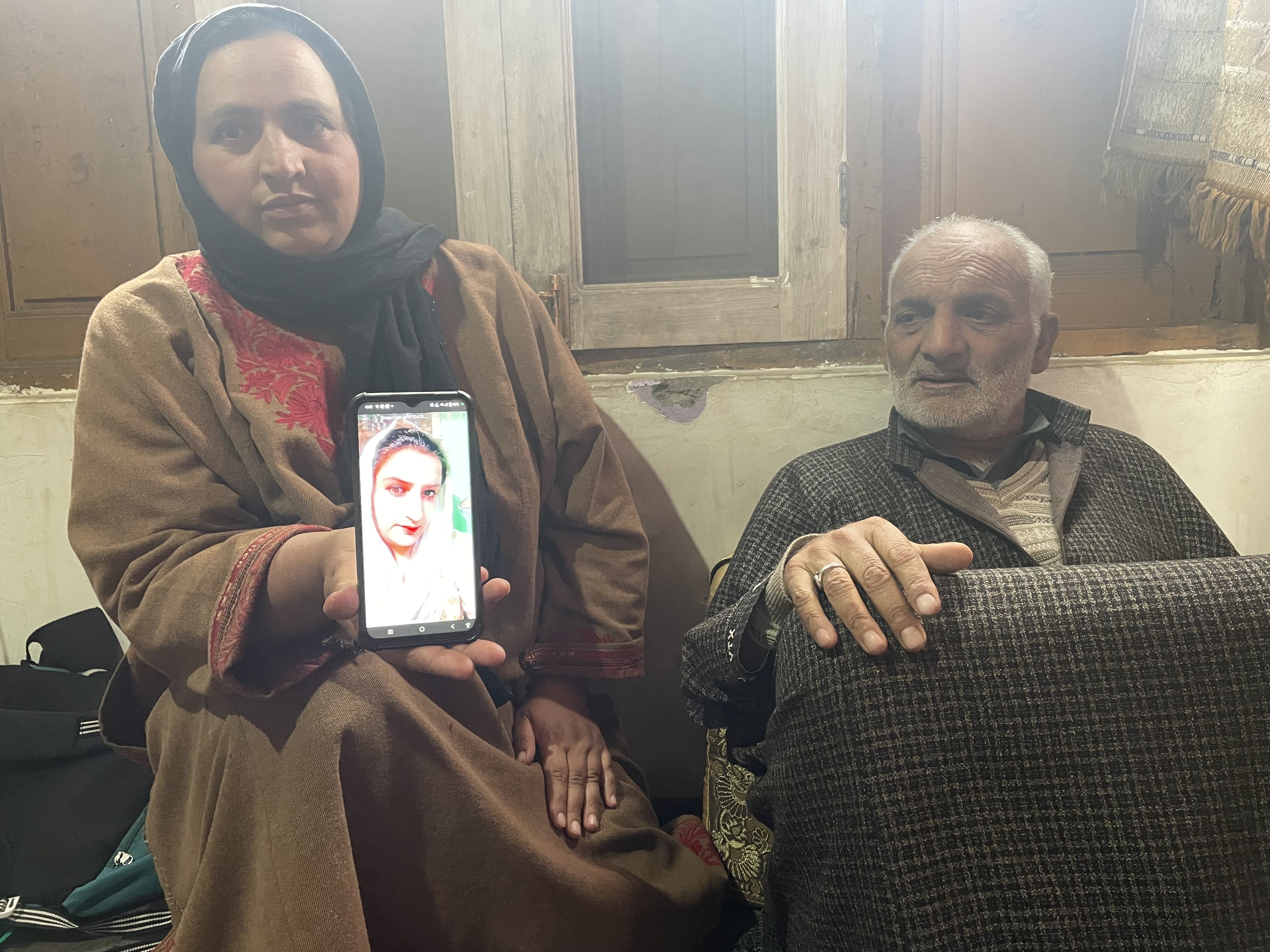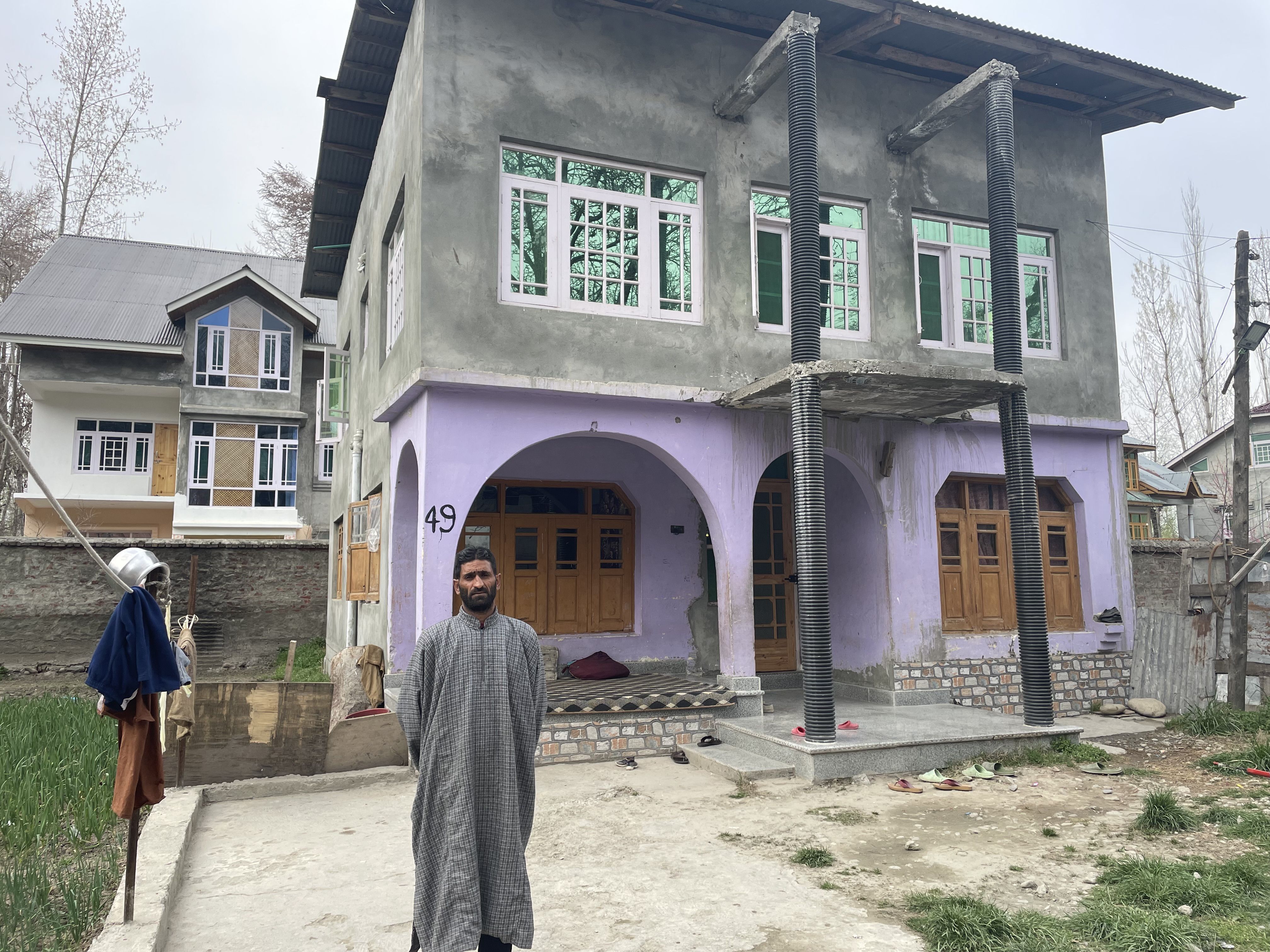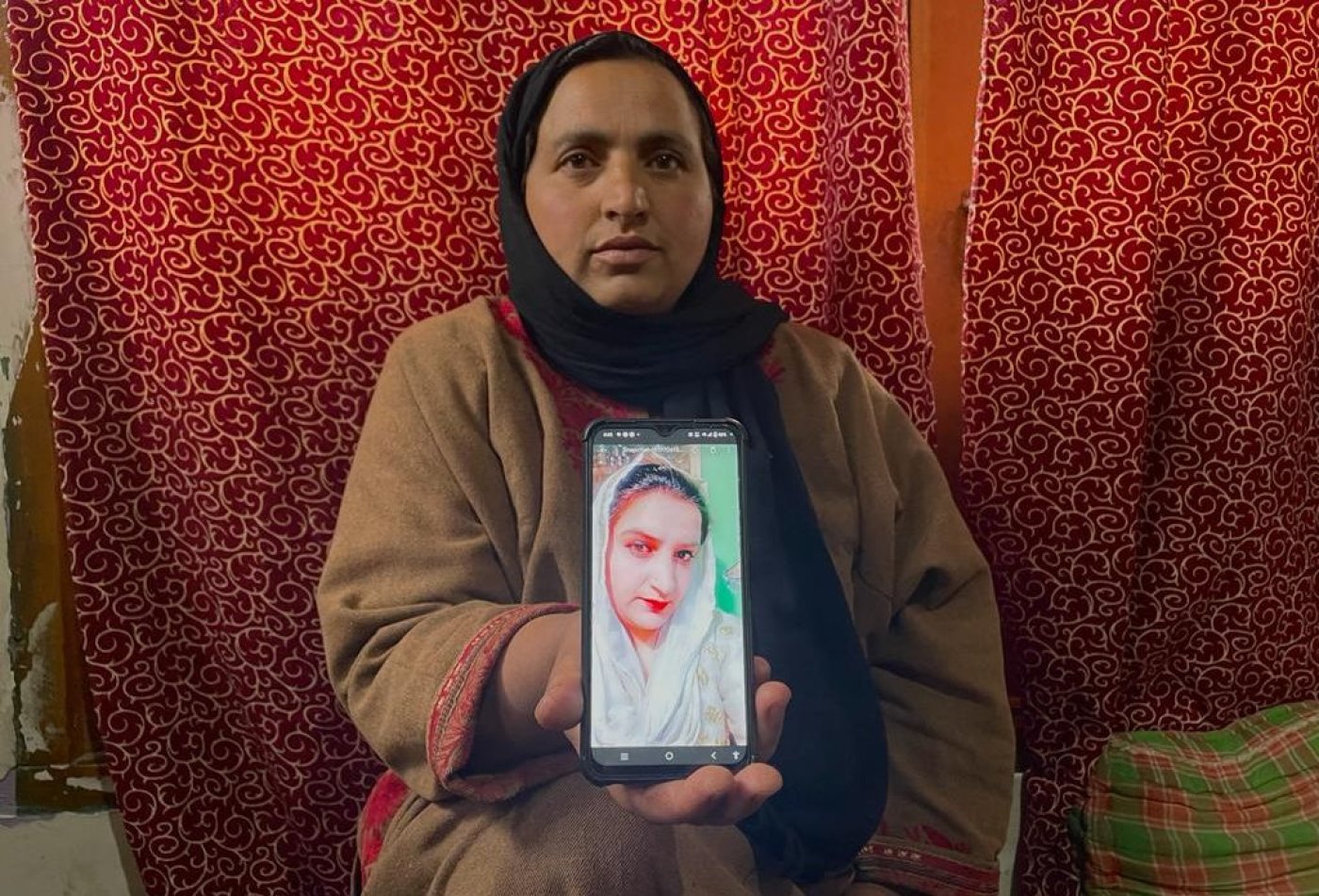Budgam (Jammu & Kashmir): The streets of Hushroo village in central Kashmir’s Budgam district remain eerily deserted, a year after this gathering of 390 homes and 1,450 people became the site of one of the most heinous murders in three decades of armed conflict in the former state.
Militants do not usually kill women. If any were killed, they were regarded as being army informers, pro-India or associated with a political party. Amreen was none of these.
An unfrequented alley leads to the double-storey residence of Amreen Bhat, a 35-year-old female television actor who was shot four times, allegedly by a militant on 25 May 2022.
More than a year after the event, Amreen's memory endures as that of a devoted daughter who fought for her family's survival until her life was abruptly cut short by armed assailants who knocked on her door, only to end it in a cold-blooded execution.
On that fateful day, Amreen had just finished her household tasks when two "unknown local men”, as her family described them, entered her double-storeyed home, 22 km south–east of the capital of Jammu and Kashmir (J&K).
"I remember both were locals, but we didn't know them," recounted Raziya, Amreen's elder sister. "One of them stood near the gate while the other engaged in conversation with her indoors."
Amreen's 11-year-old nephew, Farhan Bhat, was on the balcony of their home, while Raziya, 45, was tending to cattle in a cowshed nearby. "They asked me to call Amreen, saying they wanted to discuss a wedding at their place," said Farhan.
As Amreen stepped outside, one of the militants inquired if she would perform at a wedding. When she declined, according to Farhan, the man drew his pistol and shot her.
"Although she was hit in the throat and arm, she managed to get back inside," Farhan recollected. Unsatisfied with his initial attack, the attacker pursued her and shot her again in the foyer, sealing any chance of survival.
Farhan was also grazed by one of the bullets on his right arm, but he survived the assault. Amreen was rushed to a local hospital, where she was declared "brought dead" by the doctors.
Amreen was a beloved daughter to her ageing father and a cherished family member who was their main provider, without whom they struggle to get by and for whose murder they still seek answers in a region where few accept the union government’s frequent claims of normalcy.
"Despite the police identifying our daughter's killers and closing the case, we have the right to know why she was killed," said Khazir Mohammad Bhat.
Civilian, Militant Killings Rise
According to the J&K police, militants from the proscribed terror outfit Lashkar e Taiba (LeT) were responsible for Amreen’s assassination. They were eventually killed in an encounter two days after her murder, on 27 May 2022.
The alleged militants were identified as Shahid Mushtaq Bhat from Hafroo Chadoora, Budgam, and Farhan Habib from Hakripora area in south Kashmir's Pulwama district. The police disclosed that Bhat and Habib executed the TV artist on the orders of LeT “commander” Lateef Rather, who was later killed by security forces on 10 August 2022 in Budgam.
Despite home minister Amit Shah’s frequent assertions of “normalcy” and an “improvement” in J&K, the latter claim made in Parliament on 9 August 2023, nearly twice as many militants and civilians were killed after the end of J&K’s statehood in 2019 until 2022 compared to the four years to 2015, according to data from the South Asian Terrorism Portal (SATP). The latest death toll is similar to that reported in the period of 2016 to 2018, when unrest was evident in Kashmir.
On 10 July 2023, the union government filed an affidavit in the Supreme Court claiming that J&K, where 41,000 people have been killed over three decades of violence, was living through an “unprecedented era of peace, progress and prosperity”.
“The facts, however, suggest otherwise,” said a report released on 3 August 2023, Five Years Without An Elected Administration: Human Rights in Jammu and Kashmir, August 2022 to July 2023, by The Forum For Human Rights in Kashmir, chaired by former union home secretary Gopal Pillai and Radha Kumar, former member of the group of interlocutors for J&K. The group’s members include former Supreme Court and high court justices, former military officers and bureaucrats.
The report listed “vitiation of land and domicile rights, marginalisation and even purges of local personnel in the civil and police services, questionable arrests under draconian legislation, communication bans, media intimidation, and routinised curbs on the freedom of expression and movement”.
Examining SATP data over the past four years, 2019-2023, the report noted “a rising trend of violence between 2019-2020, when total deaths due to militant attacks and counter-insurgency operations were reported to be 52 in August-December 2019, rising to 321 in 2020, followed by a declining trend, when the number fell to 274 in 2021, 253 in 2022 and 51 in January-July 14, 2023”.
“Taken together, the data suggests that while the security situation might have improved from 2019, it is considerably worse than it was prior to 2019, especially during the interregnum years of 2012-2015,” said the report.
In 2020, 32 civilians were killed, and 37 in 2021, according to union home ministry data. As many as 26 civilians died in 2022, the year Amreen was shot, a toll higher than in any of the four years to 2015.
‘Fond of Acting’
Amreen embarked on her acting journey in 2004, joining local, small-budget film productions in Kashmir, despite initial hesitations from her father Khazir Mohammad Bhat, 75, a farmer.
"At first, I was unsure about allowing her to pursue acting as a career due to social implications, but I realised she wouldn't give it up as she was passionate about it," said Khazir Mohammad. "I believed it wouldn't harm her. Unfortunately, I was mistaken."
Amreen worked with the state broadcaster Doordarshan in Srinagar and acted in numerous locally-produced daily soap operas. Her earnings initially ranged from Rs 1,000 to Rs 1,500 per day. "Before she was killed, she was charging Rs 6,000 per day," said Khazir Mohammad. She travelled to other states, such as Delhi and Dehradun, for work, earning up to Rs 50,000 per month.
With the rise of social media, Amreen launched her YouTube channel and gained popularity on platforms like YouTube and Instagram, boasting over 25,000 and 14,000 followers, respectively. She posted videos of her singing and lip-syncing to Bollywood songs and famous movie dialogues, attracting numerous likes. As her fame rose, she was also a prominent presence on TikTok until it was banned by the union government in June 2020. Her family deactivated all her social media accounts after her murder.
Well-known Kashmiri singer Mehmeet Syed described Amreen as a hardworking individual who was open to working in local serials, albums, and commercials. "I knew her since I started in 2004,” said Syed. “She was talented and hardworking.”
Ahmad Ali Fayaz, a senior journalist, recalled that the “pressure” on artists and actors working in different local television channels started when militancy erupted in the 1990s.
“A number of TV artists were abducted, harassed and few killed at the time (1990s) by the militants—for allegedly running Government’s propaganda in Kashmir,” said Fayaz, who has covered the Kashmir conflict for years. “The militants called acting in television channels unislamic.”

‘A Breadwinner’
Amreen married a man from north Kashmir's Baramulla district in 2012, but the marriage ended within a month, and they both filed for divorce.
"Since then, she has lived with us and for us,” said Raziya. “She rejected the idea of remarrying.”
Khazir Mohammad always worried about who would take care of the family in his old age. He asked his former son-in-law, Zubair Ahmad, to live with them, a departure from the customary practice in Kashmiri society. However, Ahmad, a labourer, struggled to make ends meet.
"Due to financial constraints, we depended on Amreen. She was our son, looking after us and working hard to sustain our household. We didn't just lose a daughter; we lost our breadwinner," said Khazir Mohammad.
With limited income sources, the family struggles to maintain their household. In winter, Khazir Mohammad used to take his father to Jammu to escape the cold, but that is no longer feasible.
"I'm struggling to afford my medications now," Khazir Mohammad lamented.
Amreen's mother passed away from a brain tumour when Amreen was only eight years old.
Amreen's sister Raziya struggled to conceive a second child for eight years due to health issues. As her husband's earnings were modest, Amreen financed her sister's medical treatment, allowing her to finally conceive.
"I recall she spent around Rs 2 lakh on my treatment, and because of her, I was able to conceive and give birth to my second child," Raziya recounted tearfully. "Amreen cared so much for my first child that she jokingly said, 'You keep the second one; I'll take care of the elder one.'"
Amreen supported her nephew financially, providing him with pocket money each day. "She was his true mother," Raziya added.

The Silence of Fellow Artists
After the hospital formalities, Amreen's body was returned to her home. Grief enveloped the entire village, and she was laid to rest in a local graveyard on 25 May 2022.
Prominent political figures of the region, including former chief ministers Omar Abdullah and Mehbooba Mufti, condemned the killing. The lieutenant governor of the newly-formed union territory, Manoj Sinha, visited Amreen's home to offer his condolences, pledging "possible assistance" and support for the family.
After a few weeks, the family received a compensation of Rs 10 lakh from the administration, though they were, they said, shocked by the "criminal silence" of fellow artists.
"No one from the artist community visited our home or shared our pain," Raziya said. The family was perplexed by the absence of candlelight vigils, social media outcry, and condemnation.
Girls and young women singing and dancing in Kashmir are often regarded as taboo and "against the religion." Nonetheless, in Amreen's case, the reasons behind her killing remain unclear.
Renowned singer Mehmeet Syed expressed uncertainty about why the Kashmiri artist community failed to show solidarity with Amreen's family. She did, however, emphasise that no one should suffer a fate like Amreen's.
"I don't know the details of her killing, but confusion aside, nobody deserves such a tragic end,” said Syed. “She was the sole breadwinner of her family, and it's truly unfortunate."
Syed explained that she focuses solely on her work and avoids involving herself in other activities, particularly politics.
"Life in Kashmir is incredibly unpredictable,” she said. “You can't predict what the next moment holds.”
A police officer stationed in Budgam revealed that militants had compiled a list of women engaged in "immoral activities," including singing and dancing and sharing their performances on social media. However, public outrage led to the plan backfiring.
"Amreen was their (militants') initial target, but the plan was abandoned due to the widespread backlash over her killing," the unnamed official explained.
Sakeena Reshi, another local singer from Bandipora district, reported threats from unknown individuals to the police shortly after Amreen's death.
"I was informed that I was also on their list and should stop singing. But I'm singing for my family," Reshi asserted.
Reshi and Amreen were close friends who were recording songs at SMA Films Studio in Srinagar. They had plans to collaborate on a show together. "We spoke the day before her death,” said Reshi. “I was stunned when I heard about her murder."
Reshi regretfully noted that senior artists in the valley failed to provide the same level of support to a "rural artist."
"Nobody spoke about her,” said Reshi. “She entertained people through her work, yet she was forgotten.”
Prominent Kashmiri singer and composer Waheed Jeelani contradicted this narrative, stating that many artists visited Amreen's family and shared their grief. He emphasised that the artist community stood beside her.
However, he acknowledged that speaking out about anything in Kashmir was challenging due to the ongoing "situation."
"None of us artists have ever been killed in Kashmir, so we were all shocked by her death and still don't know who was behind it or why," said Jeelani.
Meanwhile, the family's trauma persists, with doors locked throughout the day to prevent strangers from entering their home.
"We still live in fear,” said Khazir Mohammad. “Our neighbors are the reason we remain here; otherwise, we would have fled."
(Auqib Javeed is an independent journalist based in Jammu and Kashmir.)
Get exclusive access to new databases, expert analyses, weekly newsletters, book excerpts and new ideas on democracy, law and society in India. Subscribe to Article 14.

